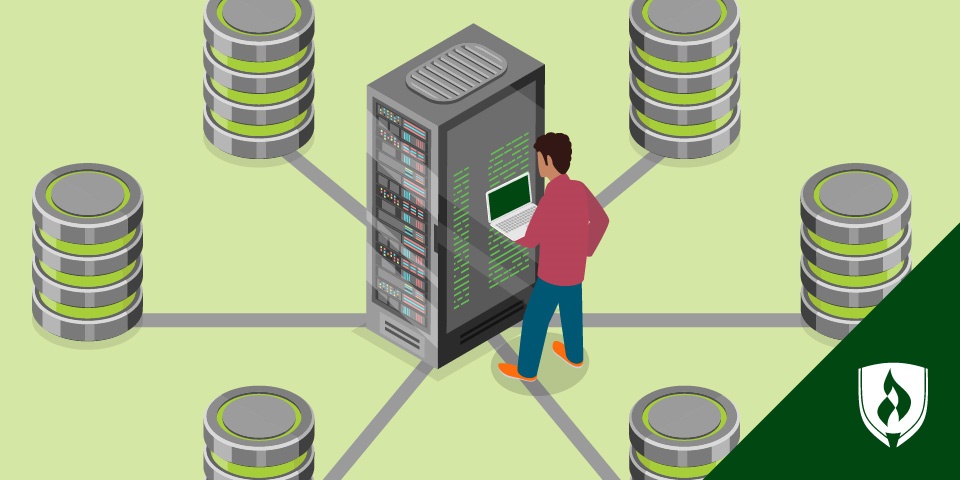
You can’t build a house or fly to Tuscany from the comfort of your couch, but with a computer and a good Wi-Fi connection, you can accomplish a lot in your own living room—including earning a living. The number of employees working remotely for at least part of their week has been steadily increasing. It’s clear that work-from-home opportunities overall are becoming more common—and work from home tech jobs are a sizable portion of those opportunities.
So what tech roles lend themselves well to remote work? What else should you know about remote work? In this article we’ll take a closer look at work-from-home tech jobs and what you need to know about these potential opportunities
What to know about work-from-home tech jobs
Before you put in your two weeks’ notice and start polishing up your resume, it’s important you have your expectations properly calibrated. For most work-from-home tech jobs, it’s not as simple as taking a few tech courses and setting up shop by your favorite window at home. In a lot of cases you’ll likely need to first build experience and trust in a traditional office setting before being given the opportunity to work remotely.
Additionally, a good percentage of the work-from-home tech opportunities out there may be coming in the form of self-employment or as a temporary consultant—both of which can come with drawbacks or other complications to navigate. That said, there’s still plenty to like about working from home—you can potentially avoid frustrating commutes, save money on fuel and cater your work environment to what works best for you.
Now that we’ve got that out of the way, let’s take a closer look at the remote-work tech roles you may be able to find.
8 Tech jobs you could potentially do from home
We’ve made a list of tech jobs that will continue to be in demand in the coming years according to the Bureau of Labor Statistics (BLS). Between freelancing, working fully remote or splitting your time between the office and your favorite coffee shop, one of these eight tech jobs could be your ticket to kicking your commute to the curb.
1. Computer user support specialist
- Projected employment growth (2018-2028):10 percent (83,100 jobs)2
- Other potential titles: Help desk technician, technical support specialist
- Education requirements: Post-secondary certification or an associate’s degree are most common, though larger companies may prefer a bachelor’s degree.2
After you’ve spent two hours fighting with your computer and trying not to pull your hair out, this is the person you call. User support specialists are the people who walk you through an update, troubleshoot your network connection, and diagnose issues for further service work if needed.
In this field, it’s all about decoding technical jargon into language everyone can understand and patiently walking end users through their issues. If you want to build your communication and customer service skills, this is the job to do it.
2. Computer systems analyst
- Projected employment growth (2018-2028): 9 percent (56,000 jobs)2
- Other potential titles: Systems architect, systems integration manager
- Education requirements: A bachelor’s degree in a computer-related field is recommended though some business graduates with systems experience are also qualified.2
As a computer systems analyst, you would be working with businesses to make the most of IT. Say, for example, a marketing firm needs help improving their time tracking software. It’s up to you to evaluate what’s working and what isn’t about the system, to research solutions, create a cost-benefit analysis, and give that firm some new options. They may also ask you to create training materials on the software you implement.
3. Software quality assurance engineer
- Projected employment growth (2018-2028): 7-10 percent (35,700 jobs)3
- Other potential titles: Quality assurance technician, quality control administrator
- Education requirements: A bachelor’s degree is most common in this position.3
If you’re the kind of person who likes to play the devil’s advocate, this may be the career for you. One of your main duties will be to look for glitches in software. You will run manual and automated tests on code to determine things like whether or not a web application will hold up under user traffic. QA professionals meticulously document their efforts to poke holes in code, identifying bugs and security issues for development teams to resolve.
This is an incredibly important part of the development process as even a small oversight can lead to massive issues. If you’ve ever used a clunky app with navigation issues or purchased a videogame with gameplay-breaking glitches, you’ll understand how valuable a strong QA process can be.
4. Computer and information systems manager
- Projected employment growth (2018-2028): 11 percent (46,800 jobs)2
- Other potential titles: IT manager, IT project manager
- Education requirements: A bachelor’s degree in a computer-related field, years of experience, and potentially a master’s in business administration (MBA) or information systems (MIS) are often required for high level IT managers.2
This senior technology role is often responsible for leading entire IT organizations or large projects. Not only will you track the needs and progress of IT systems, but you’ll be communicating with professionals across the range of this list. This role requires a broad understanding of technical issues as well as a good sense for business—it’s not just about identifying what IT approach can solve a problem, but what approach can solve it for less while being efficient and scalable. Remote work opportunities for these roles are most likely to come in the form of consulting services.
5. Software developer
- Projected employment growth (2018-2028): 21 percent (284,100 jobs)2
- Other potential titles: Application developer, desktop developer
- Education requirements: Typical entry-level positions require a bachelor’s degree in software engineering, mathematics, or computer science in addition to some programming experience.2
These professionals are the folks building applications, games and other important software for any variety of uses. They use their programming and logical know-how to connect databases and systems in order to produce desired outputs. Often software developers work in teams to tackle portions of a larger project—which means communication and coordination between other professionals plays a key role, particularly when something inevitably goes wrong.
This role requires creativity, logical reasoning ability, attention to detail and a lot of perseverance. What you think will work can fail for unforeseen reasons and you’ll need all of these to determine how to proceed and fix issues.
6. Web developer
- Projected employment growth (2018-2028): 13 percent (20,900 jobs)2
- Other potential titles: Front-end developer, back-end developer
- Education requirements: An associate’s degree is most common in this category; however some employers may prefer a bachelor’s degree.2
The work of a web developer is somewhat similar to a software developer, but, as the name suggests, they only work on websites. Whether you want to create the look and feel of a site or its hidden functions between servers and databases, web development offers an inside look into your favorite places on the internet.
No matter the web development role, coding and scripting languages will play a prominent role in your work. For every flashy button, structured paragraph, or search function, there is code working behind the scenes. When it comes to remote work opportunities, freelance web development can be a viable option—there’s a lot of businesses and organizations of all sizes that could use professional web development services to get their websites running smoothly and looking great.
7. Database administrator
- Projected employment growth (2018-2028): 9 percent (10,500 jobs)2
- Other potential titles: Data management specialist, data integrity manager
- Education requirements: A bachelor’s degree in computer science or another information technology-focused area is typically required.2
Data is the key to what makes our favorite software work. Applications regularly gather and store user information, and that information is often used as inputs for producing a desired result. Databases are the repositories for that crucial information and they need to be properly set up and maintained in order to play nice with the systems accessing them. Database administrators are the people responsible for making that happen—they develop the structure for how data is stored, “clean” data, ensure data is stored securely and maintain backups of crucial information.
Their goal is to produce the right information to the right users at the right time. This involves a keen understanding of data security, software and structured query language (SQL), the most common database language.
8. Information security analysts
- Projected employment growth (2018-2028): 32 percent (35,500 jobs)2
- Other potential titles: Cybersecurity engineer, information security specialist
- Education requirements: A bachelor’s degree in Cyber Security or another computer-related field is expected, though some roles may call for a master’s degree.2
Think of the last time you ordered a pizza online and the information you gave up—in all likelihood you gave your address and important payment information to this organization with an implied agreement they’ll keep that information secure. That’s a big part of why information security roles are projected to see a massive growth.
More and more devices are connected to the internet and gathering valuable information that criminal hackers would love to access. Information security analysts assess the ability of their organization (or a client’s) IT infrastructure to ward off breaches. They routinely perform security tests, keep up on new threats and their countermeasures, and work to minimize damage in the event of a security failure.
As cyberattacks become more sophisticated and information becomes more valuable, the need increases for motivated professionals who can stay one step ahead of the game. Those looking to make a direct impact with their tech skills will find information security a rewarding career.
There’s no place like home
As more industries realize the value of work-from-home flexibility, computer and IT services is one of the most well-suited for this advancement. With increasingly efficient communication and collaboration software, employees who might otherwise be overlooked are given the chance to pursue their career passions in a way that works for them.
These eight careers are just a few of the many options you could find as a remote tech employee. With the right equipment and some discipline, there are hundreds of different jobs to choose from. Whether you’re new to the industry or are looking for the next step in your career, we’ve made a quiz to help you decide which path is right for your talents: “Which Tech Degree Is Right for Me?” Also check out IT sales, an inside look at this tech role.
1Gallup, America’s Coming Workplace: Home Alone, [accessed November, 2019] https://news.gallup.com/businessjournal/206033/america-coming-workplace-home-alone.aspx
2Bureau of Labor Statistics, U.S. Department of Labor, Occupational Outlook Handbook, [accessed November, 2019] www.bls.gov/ooh/. Salary data represents national, averaged earnings for the occupations listed and includes workers at all levels of education and experience. This data does not represent starting salaries. Employment conditions in your area may vary.
3Bureau of Labor Statistics, U.S. Department of Labor, Occupational Employment Statistics, Software Quality Assurance Engineers [accessed November, 2019] https://www.onetonline.org/link/summary/15-1199.01
EDITOR’S NOTE: This article was originally published in 2014. It has since been updated to include information relevant to 2019.




